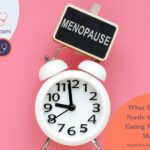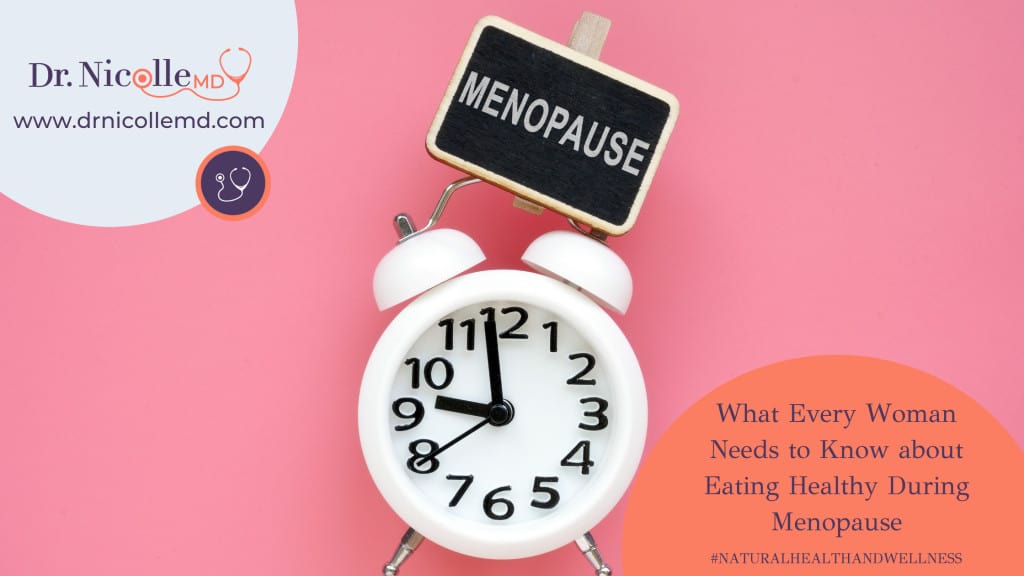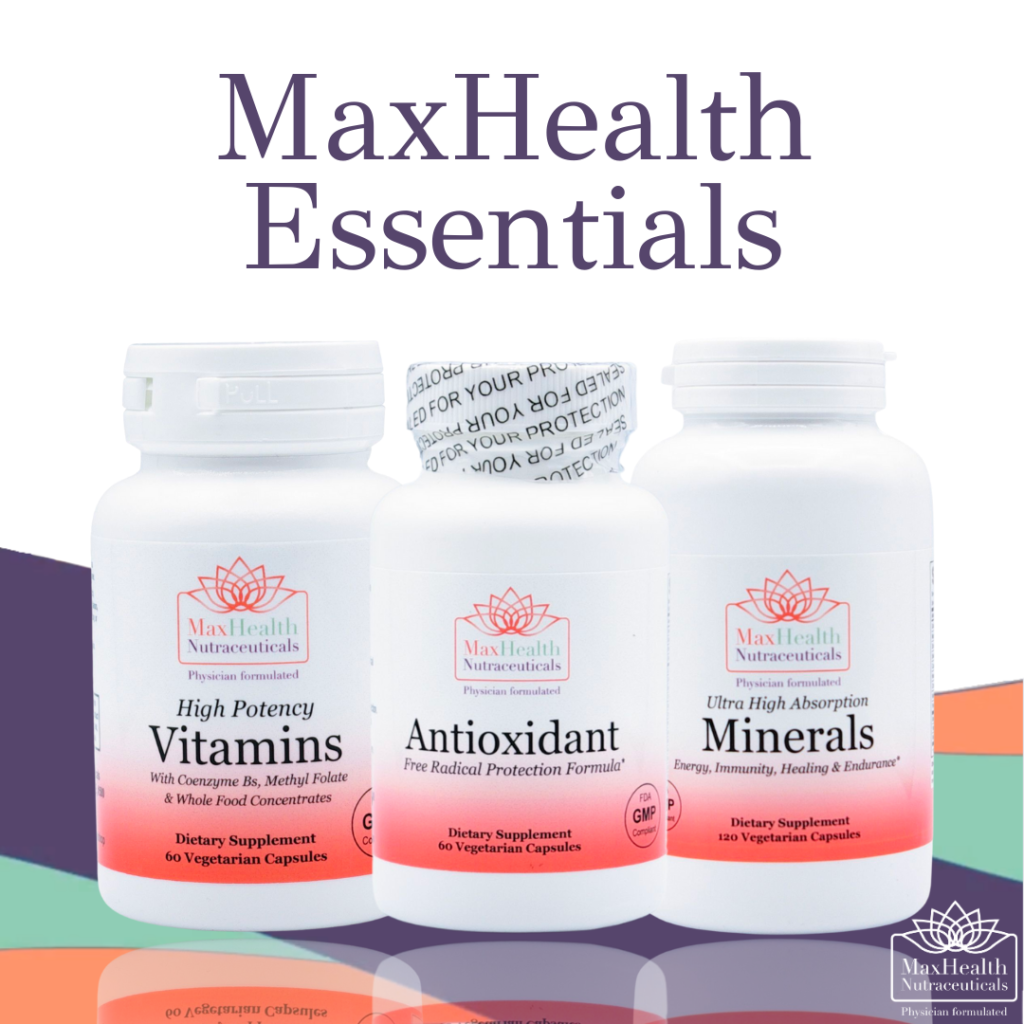

It’s Wellness Wednesdays! We’ll talk about what every woman needs to know about eating healthy during menopause. Menopause is a natural part of life, but it can have unwanted consequences. Fortunately, many of these symptoms can be controlled through simple changes to your diet. Find out how to lose weight, reduce hot flashes, and protect your heart and bones.
Manage Your Weight:
1. Increase your fiber intake. Your metabolism slows down as you age. Plus, after menopause, women tend to gain weight around their waistline, where it can have the most harmful health effects. Eating more fiber is one of the easiest ways to slim down because you’ll feel full while eating fewer calories.
2. Load up on vegetables and fruit. In addition to providing important nutrients, vegetables and fruits are packed with fiber. Whole grains are another good source.
3. Calculate your portions. At the same time, trying to avoid any treats can backfire because you’re more likely to start craving chips and candy. Enjoy your favorite foods but limit the serving size.
4. Make high-impact choices. Would you like to simplify your diet with just 3 steps? Cutting back on sugar, limiting meat and cheese, and consuming more fruits and vegetables helped post-menopausal women lose weight and keep it off, according to a University of Pittsburgh study.
5. Exercise regularly. Healthy eating works even better when you make it part of an active lifestyle. Aim for at least 30 minutes of moderate exercise on 3 days a week or more.
Reduce Hot Flashes:
1. Try soy. Expert opinions vary, but there is some evidence that isoflavones in plant-based foods may help to relieve hot flashes and other menopause symptoms. Good choices include soy products in their most natural state, like tofu, soy milk, and edamame.
2. Drink water. Staying hydrated may make hot flashes less frequent. It will certainly help to replace lost fluids and keep you more comfortable.
3. Avoid triggers. There are also foods and beverages that tend to aggravate hot flashes. Try cutting back on alcohol, caffeine, and spicy dishes.
Protect Your Heart and Bones:
1. Choose whole foods. The same diet that’s beneficial for your overall health will help strengthen your heart and bones. The American Heart Association recommends a variety of fruit and vegetables, whole grains, lean proteins, nuts and legumes, and healthy fats. That’s important because the risk of heart disease and osteoporosis increases after menopause.
2. Focus on omega-3 fatty acids. A diet rich in omega-3s helps to reduce LDL cholesterol and may even help prevent mood swings. Dine on fatty fish like tuna and mackerel, and snack on nuts and seeds. Ask your doctor about taking supplements if you think you need more.
3. Cut back on sodium. A diet high in sodium can raise your blood pressure and make you more vulnerable to osteoporosis. Most of the salt in your diet probably comes from processed foods, such as frozen dinners, canned soups, and condiments, so try to prepare more meals from scratch and read labels carefully.
4. Monitor your calcium. A diet rich in calcium helps to slow bone loss, especially if you start early. Whatever your age, ensure you’re eating a variety of foods like dairy products, green vegetables, almonds, salmon, and seeds.
5. Consume more vitamin D. Vitamin D is also essential for bone health and comes from sunlight and food sources. Talk with your doctor about how much you need.
While you’re caring for your body, remember that menopause can also have mental effects, such as mood changes and memory issues. Save room in your diet for brain foods, like fatty fish and blueberries, that may even help to prevent dementia.
Overall, choosing to eat healthy is one of the most effective ways to reduce your risk for conditions associated with menopause and stay active in your golden years.
I would love to give you a free resource sheet to support your overall wellness. Click the button below to receive your gift.
I really wanted to talk about this topic today because your natural health and wellness is important. You can adopt healthy lifestyle practices that improve your health, your environment, and enrich your life, which can in turn improve the lives of those close to you. You have the power to break the cycle of poor health, including chronic disease, so that you can leave a legacy of health to your loved ones.
I use functional medicine and lifestyle medicine as the first line of treatment, before medications, to treat lifestyle-related chronic diseases. Lifestyle-related chronic diseases include diabetes, hypertension, obesity, and some cancers, just to name a few. Lifestyle practices, such as eating a whole-food plant-based diet and regular physical activity, can help you lose weight, reverse some chronic diseases (if you suffer from them), and can even help you with detoxification. In certain cases, these approaches may even outperform pharmaceutical therapy.
But I always tell my patients that conventional medications may be appropriate at this time to prevent catastrophic illness, but over time, you can work to make the necessary lifestyle changes to possibly reduce and/or eliminate medications. Please remember to always consult your physician for your particular needs and circumstances prior to making any decisions whatsoever.
Is Dietary Supplementation Right For You?
For some people, vitamin and mineral supplements offer important health benefits. Supplements are designed to fight deficiencies found in our diet and complement the food we eat regularly. Supplements are basically “helping hands” to our daily food.
If you suspect that you aren’t getting the nutrients you need, consider shifting your focus from supplements to eating better.
But it is very important to note that we are not eating the same foods we ate years ago because the soils have been depleted of critical nutrients through current industrial farming practices. And because the soil is not as good as it used to be, the food supply (grown from the depleted soil) is not as good as it used to be. For example, you are not getting the same levels of magnesium as you would have gotten 30 or even 50 years ago.
Second, much of the food has been genetically altered, which can impact the inherent and unique nutritional composition that each food possess. For example, ancient einkorn wheat has less gluten, more protein, more Vitamin A, and more beta carotene, than modern genetically modified wheat.
Third, the toxic load in the environment today is much higher than 100 years ago. We can see this with global warming, toxic landfills, polluted oceans and waterways, etc. Toxicity levels interfere with nutrient assimilation and absorption not just into the foods, but into our bodies as well.
So… if you are unable to eat better, the supplements in my MaxHealth Essentials Bundle may provide the extra boost you need.
These are my favorite Wellness and Immune-Boosting Supplements to use! This MaxHealth Essentials Bundle will ensure you have the intake of the important vitamins, minerals, and antioxidants to decrease inflammation and boost your innate wellness day and night. Taken together, it’s a solid plan for increasing your body’s natural resiliency.
For best results make sure you use the supplements with dietary changes including a whole food plant-based diet, regular exercise (at least 2-3x per week), regular sleep (8 hours per night), and intermittent fasting (at least 1-3x per week).
Weight Monitoring
Since weight management is very important in combatting chronic diseases, I recommend that you be mindful of your weight and its fluctuations, and that you monitor your weight AT LEAST on a weekly basis. I recommend a scale that includes a body composition monitor (*this scale cannot be used with a pacemaker or other implanted devices).
Physical Activity
Physical activity (or exercise) can improve your health and reduce the risk of developing several chronic diseases like high blood pressure, type 2 diabetes, and cancer, just to name a few. Physical activity can improve your mood, boost your immune system, help you maintain a healthy weight, and is a great way to detox your body!
I often recommend yoga and resistance training for physical activity, but as you are aware, there are plenty of forms of “movement” that you can do! But for the basics, especially if you’re just getting started, yoga and resistance training are where I would start.
Yoga
Yoga can be a great way to improve your strength and flexibility, manage your stress, improve your heart health, and lose weight! I recommend using a grounded yoga mat to connect yourself with the earth and reduce inflammation.
Resistance Training
Resistance training is the mainstay for overall health. It not only has beneficial effects on reducing body fat, it also increases muscle size and strength. Check out some basic dumbbells/free weights that I recommend to everyone.
Another alternative for dumbbells/free weights are resistance bands. They are great for physical therapy, yoga, strength training, and excellent for traveling.
Remember, living a healthy lifestyle including eating a whole foods plant-based diet, regular physical activity, and reducing stress are the best ways to maintain a healthy weight. Let me know what you think in the comment section below.
Dr. Nicolle Martin
Some of the links in this article are "affiliate links", a link with a special tracking code. This means if you click on an affiliate link and purchase the item, we will receive an affiliate commission.
The price of the item is the same whether it is an affiliate link or not. Regardless, we only recommend products or services we believe will add value to our readers.
By using the affiliate links, you are helping support our Website, and we genuinely appreciate your support.
Last updated on July 5th, 2023 at 06:59 am

Minimize Medications. Maximize Health.
Are you super busy but need to take control of your health? Are you tired of being tired? Subscribe to my “Minimize Medications, Maximize Health Blog” and I’ll give you 7 Tips to Get Healthy in No Time absolutely FREE.






